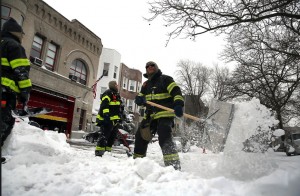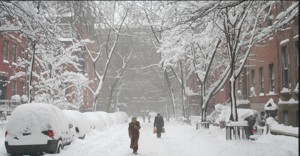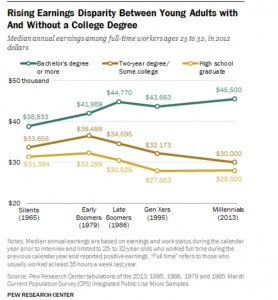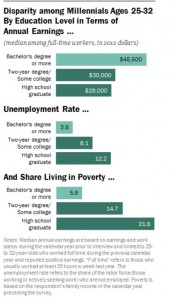Dear Commons Community,
The New York Times editorial today (see full text below) blares out at the current state of American higher education wherein the dependence on adjunct faculty combined with the rise of administrative costs is threatening the quality of what many still consider the best system in the world. These developments have been addressed in this blog before most recently two weeks ago on the issue of rising administrative costs. The editorial cites two reports.
First, “The Just-In-Time Professor, released last month by the Democratic staff of the House Committee on Education and the Workforce, describes a growing population of more than one million adjunct and other nontenure-track instructors. “In 1970, adjuncts made up 20 percent of all higher education faculty,” the report says. “Today, they represent half.”
As a rule, adjuncts have few or no benefits. They are generally paid per course, and paid poorly. (The Coalition on the Academic Workforce estimates that the median pay for a standard three-credit course is $2,700.) Because adjuncts often teach several classes in order to cobble together a living, they have little time for the research necessary to advance their careers.
This increasing dependence on inexpensive adjuncts may be bad for students, as well. According to the report, students who took more courses taught by adjuncts “experienced lower graduation rates, lower grade point averages, and fewer transfers from two-year to four-year colleges, compared to other students.”
Second, the adjunct boom has been accompanied by a parallel rise in the number of college administrators. A February report from the American Institutes for Research says that between 1990 and 2012, “the average number of faculty and staff per administrator declined by roughly 40 percent in most types of four-year colleges and universities.” By 2012, there were only 2.5 instructional or “nonprofessional support” employees (like secretaries and maintenance workers) for every one administrator (like business analysts and guidance counselors). Median salaries for administrative employees ranged between $55,000 and $60,000 in fiscal year 2013 — less than tenured professors but much more than adjuncts.
However, the New York Times does not go far enough in laying out the problems. For the past several decades, state support for public higher education which provides access to the majority of American college students has been declining. Most public colleges and universities have made up for this loss of funding by raising tuition and passing the costs of running their operations onto students. The passing of costs onto tuition can only go so far since students are already taking on significant debt in the form of federal financial aid.
We are gambling with our future. While the US Department of Education invests much of its energy trying to figure out a college ratings system, the entire enterprise is eroding at its very foundations.
Tony
=============================================
The New College Campus
New York Times Editorial
February 17, 2004
Imagine meeting someone who says she works at a university. Some years ago, it would have been fairly safe to assume that she was a professor, and a member of the middle class with enviable job security. Not anymore. Two reports make clear that the nature of the college work force has changed substantially, possibly to the detriment of educational quality.
“The Just-In-Time Professor,” released last month by the Democratic staff of the House Committee on Education and the Workforce, describes a growing population of more than one million adjunct and other nontenure-track instructors. “In 1970, adjuncts made up 20 percent of all higher education faculty,” the report says. “Today, they represent half.”
As a rule, adjuncts have few or no benefits. They are generally paid per course, and paid poorly. (The Coalition on the Academic Workforce estimates that the median pay for a standard three-credit course is $2,700.) Because adjuncts often teach several classes in order to cobble together a living, they have little time for the research necessary to advance their careers.
This increasing dependence on inexpensive adjuncts may be bad for students, as well. According to the report, students who took more courses taught by adjuncts “experienced lower graduation rates, lower grade point averages, and fewer transfers from two-year to four-year colleges, compared to other students.”
The adjunct boom has been accompanied by a parallel rise in the number of college administrators. A February report from the American Institutes for Research says that between 1990 and 2012, “the average number of faculty and staff per administrator declined by roughly 40 percent in most types of four-year colleges and universities.” By 2012, there were only 2.5 instructional or “nonprofessional support” employees (like secretaries and maintenance workers) for every one administrator (like business analysts and guidance counselors). Median salaries for administrative employees ranged between $55,000 and $60,000 in fiscal year 2013 — less than tenured professors but much more than adjuncts.
Colleges may well require more administrators in the 21st century than they did in the 20th. The American Institutes for Research report suggests, among other factors, a growing need for employees wholly dedicated to fund-raising as state legislators reduce support for higher education. Nevertheless, the new college campus, rife with adjuncts and administrators, does not seem geared to fulfill what is, after all, the major mission of universities: educating students.










